http://fontes.lstc.edu/~rklein/Documents/chronnab.htm
(This translation was made by A. Leo Oppenheim and is copied from James B. Pritchard’s Ancient Near Eastern texts relating to the Old Testament, 1950 Princeton. Some minor changes have been made, based on the new edition by A.K. Grayson.)
In October 539 BCE, the Persian king Cyrus took Babylon, the ancient capital of an oriental empire covering modern Iraq, Syria, Lebanon, and Israel. In a broader sense, Babylon was the ancient world’s capital of scholarship and science. The subject provinces soon recognized Cyrus as their legitimate ruler. Since he was already lord of peripheral regions in modern Turkey and Iran (and Afghanistan?), it is not exaggerated to say that the conquest of Babylonia meant the birth of a true world empire. The Achaemenid empire was to last for more than two centuries, until it was divided by the successors of the Macedonian king Alexander the Great. A remarkable aspect of the capture of Babylon is the fact that Cyrus allowed the Jews (who were exiled in Babylonia) to return home.
Chronicle of Nabonidus
The Chronicle of Nabonidus (scholarly edition) tells us the story of the rule of the last king of independent Babylonia. The text is badly damaged and contains many lacunas. However, it makes clear that the rise of Cyrus was not unexpected. We meet him for the first time in Nabonidus‘ sixth year (=550 BCE), when he defeats the Median leader Astyages. A second reference can be found in year nine, when he defeats the king of a country that can not be identified (547 BCE).
In addition, we learn that Nabonidus was not in Babylon for ten years. Instead, he seems to have tried to subject Arabia. In year three he conquered the kingdom Edom, which controls the direct road from Babylon to the Gulf of Aqaba. From year seven until year sixteen, Nabonidus stayed in the oasis of Temâ in the Arabian desert, from where he could easily go as far south as the oasis Iatribu (modern Medina).
The events of year seventeen look rather desperate: although the New Year’s festival (Akitu) can now be celebrated, several divine guests fail to attend, which suggests that their home towns were under siege. We also learn about a short invasion by soldiers from the Sea Land.
Throughout this text, ‘Akkad‘ means Babylonia; the first years show Babylonian military activity in Syria and the southeast of modern Turkey.
(Texts: All Artifacts, Color Coding, & Writings in Bold Type With Italics Inside Parenthesis, are Added by Editor R. Brown, not the Authors, Translators, or Publishers!)
(gods in blue …mixed-breed demigods in teal…)
[First line destroyed]
Accession year (556/555 BCE):
… he lifted.
The king brought their [lacuna] to Babylon.
First year (555/554):
They did [unintelligible] and he did not lift his [lacuna].
All their families [lacuna].
The king called up his army and marched against the country Hume
[i.e., Cilicia].
[lacuna]
Second year (554/553): In the month Tebêtu, in the country of Hamath,
it was cold.
[lacuna]
Third year (553/552): In the month of Âbu, to the Ammananum [in Cilicia], the mountains of [many?] fruit trees.
All kinds of fruits he sent to Babylon.
The king fell sick, but he recovered.
In the month Kislîmu, the king called up his army, [he sent?] to Nabû Bel-Dan of Amurru, and marched to [lacuna].
Against the capital of Edom they pitched camp [lacuna] the gateway of Šintini [lacuna] he killed [lacuna] troops.
Fourth year (552/551): [lacuna]
Fifth year (551/550): [lacuna]
King Astyages [litt: Ištumegu] called up his troops and marched against Cyrus [Kuraš], king of Anšan,
in order to meet him in battle.
The army of Astyages revolted against him and in fetters they delivered him to Cyrus.
Cyrus marched against the country Agamtanu [the Median capital Ecbatana]; the royal residence he seized;
silver, gold, other valuables of the country Agamtanu he took as booty and brought to Anšan.
The valuables of the army of [lacuna]
Seventh year (549/548):
The king stayed in Temâ; the crown prince, his officials and his army were in Akkad.
The king did not come to Babylon for the [New Year’s] ceremonies of the month of Nisannu;
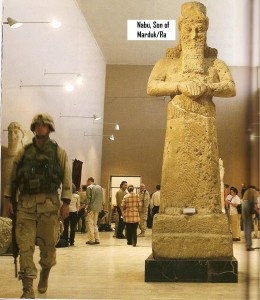 (life-sized statue of giant alien god Nabu, in our image & likeness)
(life-sized statue of giant alien god Nabu, in our image & likeness)
the image of the god Nabû did not come to Babylon,
the image of the god Bêl (Marduk) did not go out of Esagila in procession,
the festival of the New Year was omitted.
But the offerings within the temples Esagila and Ezida were given according to the complete ritual;
the urigallu-priest made the libation and asperged the temple.
Eighth year (548/547): [blank]
Nabonidus, the king stayed in Temâ; the crown prince, his officials and his army were in Akkad.
The king did not come to Babylon for the ceremony of the month of Nisannu;
the god Nabû (Marduk‘s son) did not come to Babylon,

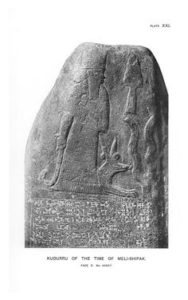 (Marduk & animal symbol & spade / rocket symbol)
(Marduk & animal symbol & spade / rocket symbol)
the god Bêl (Marduk) did not go out of Esagila in procession, the festival of the New Year was omitted.
But the offerings within the temples Esagila and Ezida
for the gods of Babylon and Borsippa were given according to the complete ritual.
In the month of Nisannu the fifth day, the mother of the king died in the Walled Camp,
which is on the banks of the Euphrates, above Sippar.
The crown prince and his army were in deep mourning for three days, an official weeping was performed.
In Akkad, an official weeping on behalf of the mother of the king was performed in the month of Simanu.
In the month of Nisannu, Cyrus, king of Persia, called up his army and crossed the Tigris below the town of Arbela.
In the month of Ajaru he marched against the country U[…], defeated its king,
took its possessions, put there a garrison of his own.
Afterwards, his garrison as well as the king remained there.
Tenth year (546/545):
The king stayed in Temâ; the crown prince, his officials and his army were in Akkad.
The king did not come to Babylon for the ceremonies of the month of Nisannu;
Nabû did not come to Babylon, Bêl did not go out of Esagila in procession, the festival of the New Year was omitted.
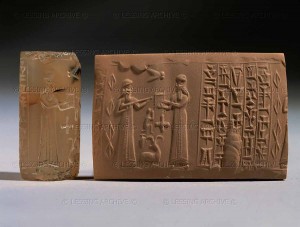 (Bel / Marduk & son Nabu the scribe)
(Bel / Marduk & son Nabu the scribe)
But the offerings within the temples Esagila and Ezida for the gods of Babylon and Borsippa
were given according to the complete ritual.
In the month Simanu, the twenty-first day [lacuna] of the country of the Elamites in Akkad [lacuna]
The governor of Uruk [lacuna]
Eleventh year (545/544):
The king stayed in Temâ; the crown prince, his officials and his army were in Akkad.
The king did not come to Babylon for the ceremonies of the month of Nisannu;
(Esagila, Marduks ziggurat residence in Babylon; Ezida, son Nabu’s ziggurat residence in Borsippa)
Nabû did not come to Babylon, Bêl did not go out of Esagila in procession, the festival of the New Year was omitted.
But the offerings within the temples Esagila and Ezida for the gods of Babylon and Borsippa
were given according to the complete ritual.
[large lacuna, containing years #12, #13, #14, #15]… the river.
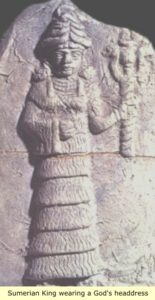
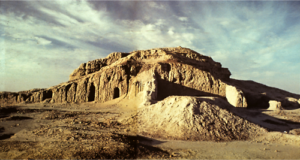 (Inanna; her ziggurat residence in Uruk)
(Inanna; her ziggurat residence in Uruk)
In the month of Addaru the image of Ištar (Inanna) of Uruk [lacuna]
The army of the Persians made an attack.
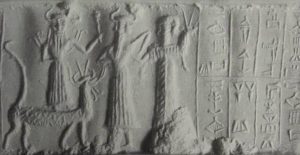 (Marduk with son Nabu leading Babylonian king by the hand)
(Marduk with son Nabu leading Babylonian king by the hand)
Nabû went from Borsippa for the procession of Bêl [lacuna]
The king entered the temple of Eturkalamma;in the temple he made a libation of wine.
Bêl went out in procession.
They performed the festival of the New Year according to the complete ritual [4 April].
In the month of [Âbu?] Lugal-Marada (NInurta’s son) and the other gods of the town Marad,
Zabada and the other gods of Kish, the goddess Ninlil and the other gods of Hursagkalama visited Babylon.
Till the end of the month Ulûlu all the gods of Akkad – those from above and those from below– entered Babylon.
The gods of Borsippa, Cutha, and Sippar did not enter.
In the month of Tašrîtu, when Cyrus attacked the army of Akkad in Opis on the Tigris,
the inhabitants of Akkad revolted, but he [Cyrus] massacred the inhabitants.
The fifteenth day [12 October], Sippar was seized without battle.
Nabonidus fled.
The sixteenth day, Gobryas [litt: Ugbaru], the governor of Gutium, and the army of Cyrus entered Babylon without battle.
Afterwards, Nabonidus was arrested in Babylon when he returned there.
Till the end of the month, the shield carrying Gutians were staying within Esagila
but nobody carried arms in Esagila and its buildings.
The correct time for a ceremony was not missed.
In the month of Arahsamna, the third day [29 October],
Cyrus entered Babylon, [unidentified objects] were filled before him – the state of peace was imposed upon the city.
Cyrus sent greetings to all Babylon.
Gobryas, his governor, installed subgovernors in Babylon.
From the month of Kislîmu to the month of Addaru,
the gods of Akkad which Nabonidus had made come down to Babylon, were returned to their sacred cities.
In the month of Arahsamna, on the night of the eleventh, Gobryas died [6 November].
In the month of Addaru, the [lacuna] day, the wife of the king died.
From the twenty-seventh day of Adarru till the third day of Nisannu
[20-26 March], an official weeping was performed in Akkad.
All the people went around with their hair disheveled.
When, the fourth day [27 March] Cambyses, son of Cyrus, went to the temple of [unintelligible],
the epa-priest of Nabû who [lacuna] the bull [lacuna]
They came and made the weaving by means of the handles
and when he led the image of Nabû [lacuna] spears and leather quivers,
from [lacuna] Nabû returned to Esagila, sheep offerings in front of Bêl and the god Mârbîti (unidentified?).
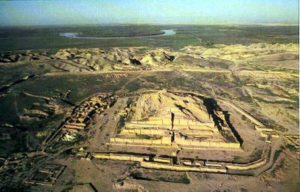
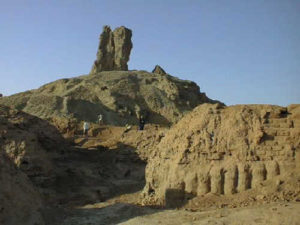
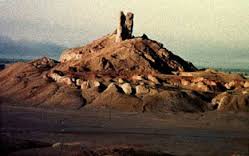
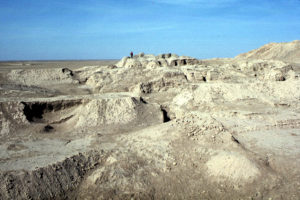 (
(